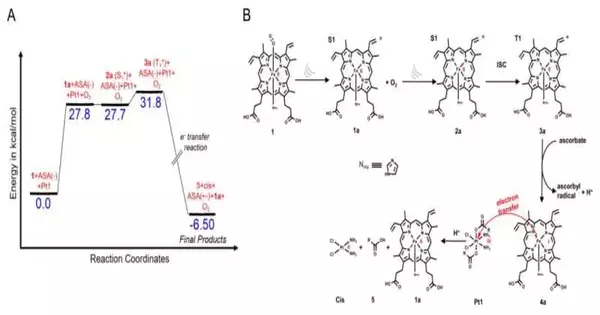Treatments involving chemotherapy have significant side effects. This issue is not present with a novel agent that builds up within the tumor tissue and is activated there by ultrasound waves.
Platinum complexes are among the most frequently prescribed cancer treatments. Although effective, they have negative side effects. A complex that builds up in tumor tissue and is activated there by ultrasound waves has been created by an international research team under the direction of Dr. Johannes Karges from the Faculty of Chemistry and Biochemistry at Ruhr University Bochum, Germany.
Thus, its cell-damaging effect only manifests where it is actually desired. According to Karges, “instead of relying on light activations that can only reach a few millimeters deep into the tissue, we have now developed a treatment method with ultrasound activation that reaches several centimeters deep into the body.”.
“These prodrugs are stable and inactive, thus they are absolutely safe. They are expected to remain that way in healthy tissue. Yet, in cancer tissue, they should be swiftly transformed into therapeutically active platinum(II) complexes.”
Dr. Johannes Karges from the Faculty of Chemistry and Biochemistry.
This might enable the treatment of tumors that are large and deeply seated with few side effects. Angewandte Chemie International Edition is where the researchers published their findings.
In sound tissue, it is harmless.
Among the most widely used cancer treatments are the platinum (II) complexes cisplatin, oxaliplatin, and carboplatin. Serious side effects like nausea, vomiting, kidney damage, and bone marrow suppression significantly outweigh their clinical success. Over the years, significant research has gone into creating so-called platinum IV complex prodrugs in an effort to get around these restrictions.
According to Johannes Karges, “These prodrugs are stable and inactive, so they are completely harmless.”. They are expected to remain that way in healthy tissue. However, they should be quickly transformed into the therapeutically effective platinum-II complexes in cancer tissue.
For the metal complex to be reduced, energy is needed. Studies from the past mentioned UV, blue, or red light activation. Johannes Karges explains that the issue is that light cannot reach many tumors because it can only travel less than a centimeter into the body. His team has for the first time combined platinum-IV complex prodrugs with sonosensitizers that can be selectively activated with ultrasound irradiation in order to get around this restriction.
In the tumor, nanoparticles gather.
The prodrugs for the platinum-IV complex and the sonosensitizers were combined to form nanoparticles in hemoglobin in order to create a therapeutically efficient complex. After being injected into the bloodstream, we were able to see that the nanoparticles only accumulated in a mouse intestinal tumor, supporting targeted therapy, writes Johannes Karges.
“After ultrasound radiation, the platinum IV prodrug was activated at the tumor site, causing the release of cisplatin, which is toxic to cells, and nearly completely eradicating the tumor.”.
Benefits of ultrasound.
These findings may help in the development of new methods and medications for the treatment of very large or deeply seated tumors. Near-infrared light cannot penetrate tissue as deeply as ultrasound. Additionally, ultrasound procedures are frequently regarded as less complicated and less invasive. Hospitals frequently come with the necessary tools, which is another benefit. According to Johannes Karges, “Our work is still fundamental research.”.
It is not yet clear whether or when treatments based on this will be made available in clinical settings.
More information: Ganghao Liang et al, Reduction of Platinum(IV) Prodrug Hemoglobin Nanoparticles with Deeply‐Penetrating Ultrasound Radiation for Tumor‐Targeted Therapeutically Enhanced Anticancer Therapy, Angewandte Chemie International Edition (2023). DOI: 10.1002/anie.202301074





